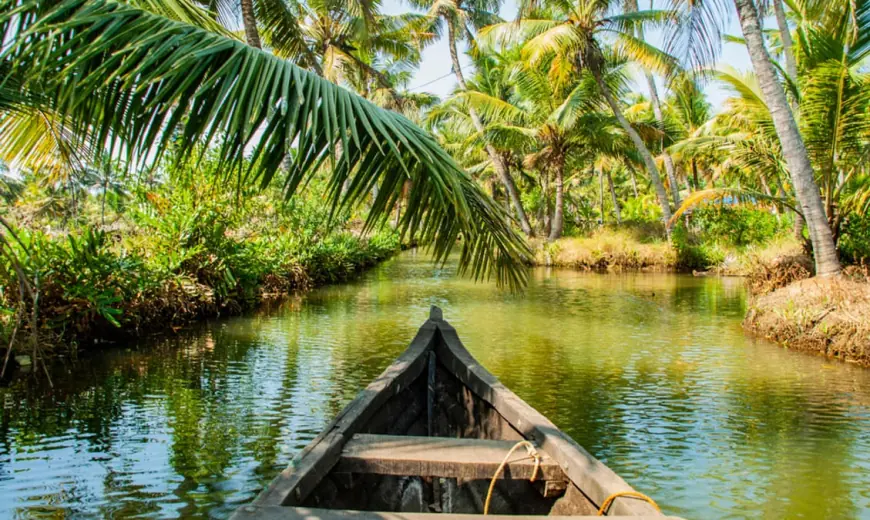Kerala’s Coconut Connection: Food, Drinks & Culture

When people think of Kerala, the first images that often come to mind are of serene backwaters, swaying palm trees, and tranquil houseboats drifting lazily across lagoons. Yet, at the heart of Kerala’s cultural and culinary identity lies a simple yet versatile ingredient—the coconut. Known locally as thenga, the coconut is far more than just a fruit here; it is woven into the very fabric of daily life, celebrations, cuisine, and traditions.
From coastal kitchens to temple rituals, from folk remedies to modern-day delicacies, coconut has shaped Kerala’s identity in ways that few other elements could. To understand the state’s vibrant culture and diverse gastronomy, you must explore its coconut connection.
Coconut in Kerala’s Culinary Heritage
Coconut finds its way into almost every dish in Kerala. Grated coconut, coconut milk, and coconut oil are essential building blocks of the cuisine. Each form offers a unique texture and flavor, and chefs across the state have mastered the art of using them in harmony.
-
Curries: From the tangy fish curry of the Malabar coast to the vegetarian stews of central Kerala, coconut milk is the base that lends richness and depth. It balances spices beautifully and creates a comforting creaminess.
-
Breakfast Staples: Soft idiyappams (string hoppers), appams with stew, or puttu paired with kadala curry all showcase coconut in different avatars. Without grated coconut, puttu—the cylindrical steamed rice flour dish—would lose its character.
-
Sweets: Traditional desserts like ada pradhaman and unniyappam are sweetened with jaggery and enhanced with coconut milk or fried coconut bits, offering a delightful balance of taste and texture.
For travelers, especially those on a Kerala family trip, this coconut-based cuisine becomes part of the adventure. Sharing a banana-leaf meal laden with coconut-flavored dishes is not just about satisfying hunger—it is about participating in a tradition that families have cherished for centuries.
Coconut Oil: More Than Just Cooking
Coconut oil is a cultural symbol in Kerala. While its role in cooking is well known, its significance extends beyond the kitchen. Traditionally, coconut oil has been used for hair care, skin treatments, and even Ayurvedic practices. Many households still prefer warming coconut oil for head massages, a ritual believed to promote relaxation and health.
In temples and during festivals, lamps filled with coconut oil are lit as offerings to deities. These glowing flames represent purity and devotion, and they highlight how deeply ingrained the coconut is in spiritual life.
Coconut Drinks: From Tradition to Trend
The tropical climate of Kerala calls for refreshing beverages, and coconut steps in here as well. Tender coconut water (elaneer) is nature’s perfect energy drink, consumed fresh on beaches, roadside stalls, and markets. Sweet, hydrating, and nutrient-rich, it has long been the state’s favorite refreshment.
In recent years, chefs and mixologists have reinvented coconut-based drinks to appeal to modern tastes. Coconut milkshakes, smoothies, and even cocktails infused with coconut flavors are now widely available. This blend of old and new reflects how Kerala embraces innovation while preserving its roots.
Cultural Rituals and Symbolism
Coconut has spiritual importance in Kerala’s customs and festivals. At weddings, the breaking of a coconut is considered auspicious—a symbol of purity and prosperity. In Hindu rituals, coconuts are offered to deities during pujas, representing the breaking of ego and surrender to divine will.
During the grand festival of Onam, coconut-rich dishes dominate the Onasadya feast. Similarly, in temple festivals across the state, coconuts play a role in offerings, rituals, and even processions. This constant presence across religious and cultural life shows how the coconut has become more than just food—it is a medium of expression and devotion.
Coconut in Handicrafts and Economy
Beyond the edible part, every bit of the coconut tree is put to use in Kerala. The husk yields coir, which is spun into ropes, mats, and handicrafts. Coir industries provide livelihoods to thousands, particularly in coastal towns like Alappuzha.
Palm fronds are used for weaving baskets, mats, and even thatching roofs in traditional homes. Coconut shells, polished and carved, turn into utensils, ladles, and decorative art pieces. This sustainable approach highlights Kerala’s deep respect for nature—nothing goes to waste.
Coconut & Ayurveda
Kerala is also famous for its Ayurvedic heritage, and coconut plays an integral role in many treatments. Warm coconut oil is used in therapies like abhyanga (massage), which is believed to detoxify the body and rejuvenate the mind. Herbal oils often use coconut oil as a base, absorbing the medicinal properties of plants.
For wellness seekers, the coconut thus represents healing as much as nourishment. It embodies Kerala’s holistic philosophy of life—where food, health, and culture are seamlessly interwoven.
Coconut in Everyday Life
What makes the coconut so central to Kerala is its presence in daily rhythms. Morning begins with coconut chutney alongside dosa or idli. Markets bustle with vendors splitting open tender coconuts for thirsty customers. Festivals, weddings, and family gatherings cannot be imagined without it.
Even language reflects this bond. The very name “Kerala” is believed by some to mean “land of coconuts” (Kera = coconut, Alam = land). And indeed, the swaying coconut palms are not just scenic—they are living emblems of the state’s identity.
Coconut as a Bridge for Travelers
For tourists, engaging with Kerala’s coconut traditions provides more than just a glimpse of local flavors—it becomes a way to connect with people and stories. Cooking classes often begin with grating fresh coconut, letting travelers experience firsthand the patience and rhythm of the process.
Staying in a homestay or joining a family for a meal opens doors to understanding how coconuts feature in hospitality and daily warmth. For families traveling together, these experiences add unique layers of connection and learning that make the journey memorable.
Modern Innovations with Coconut
While tradition holds strong, Kerala’s chefs and entrepreneurs are reimagining coconut for global audiences. Coconut chips, cold-pressed oils, vegan milk alternatives, and beauty products are gaining popularity both within and outside India.
These innovations show how a humble fruit has adapted to modern lifestyles without losing its essence. Kerala’s coconut connection thus remains both timeless and forward-looking, bridging generations and cultures.
Conclusion
Coconut is not just an ingredient in Kerala—it is the heartbeat of its culture, food, and everyday life. It flavors the cuisine, nurtures wellness, fuels rituals, and supports livelihoods. Travelers who take time to explore this coconut connection return home with more than memories of beaches and backwaters; they carry an appreciation of a community deeply tied to nature.
And while enjoying this cultural journey, it’s easy to see why many families return again and again—sometimes planning their entire Kerala family trip around not just sights, but also flavors and traditions. Later, when choosing the right Kerala trip package
, the thought of savoring coconut-rich curries, sipping fresh tender coconut water, and participating in age-old rituals becomes as much a highlight as cruising the backwaters or relaxing on the beaches.
In Kerala, every coconut tells a story—and every story invites you to be part of its timeless rhythm.
What's Your Reaction?
 Like
0
Like
0
 Dislike
0
Dislike
0
 Love
0
Love
0
 Funny
0
Funny
0
 Angry
0
Angry
0
 Sad
0
Sad
0
 Wow
0
Wow
0




















































